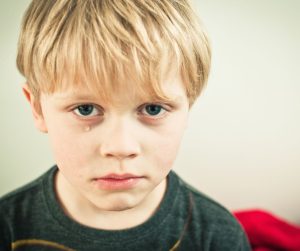 A Connective Parent asked about how toddlers learn self-control. Every parent needs real-life solutions to tantrums.
A Connective Parent asked about how toddlers learn self-control. Every parent needs real-life solutions to tantrums.
Q. My two and a half year old is in the heart of his terrible twos with lots of tantrums especially when he’s had it by the end of the daycare week. But what I don’t understand is when he seems fine, eating his yogurt and berries that he loves in his highchair, and suddenly, with no apparent emotion, he flings his bowl across the room making a horrible mess. What am I supposed to do then? Other times, he runs away from me and doesn’t listen when I yell to him to stop. What do I do to get him to listen? Am I’m allowing this behavior by not punishing him?
A. Impulses are a strange thing. We don’t know where they come from (maybe a brain scientist does) and certainly can’t see them coming. There is no way to prepare yourself or to head them off at the pass. They come from deep inside and often don’t seem to have any connection Read more…








 Boundaries refer to the separation of responsibilities between me and my child. Limits refer to what behaviors I am ok with and what I am not. To have appropriate limits, it is essential to establish healthy boundaries.
Boundaries refer to the separation of responsibilities between me and my child. Limits refer to what behaviors I am ok with and what I am not. To have appropriate limits, it is essential to establish healthy boundaries. Heightened aggression in children, characterized by intense anger outbursts, defiance, and physical attacks, impacts children’s social interactions, academic progress, and emotional growth. Crucially addressed in early childhood, this issue, if unchecked, can result in lifelong anti-social or
Heightened aggression in children, characterized by intense anger outbursts, defiance, and physical attacks, impacts children’s social interactions, academic progress, and emotional growth. Crucially addressed in early childhood, this issue, if unchecked, can result in lifelong anti-social or  Story: My strong willed 8 year old was diagnosed with anxiety and displays this with anger. Last March I got diagnosed with cancer and needed surgery. His anxiety hit the moon. He’s been acting out by throwing a ball at kids, stepping on their feet, throwing sand, yelling, etc. I practiced your principles of empathy, and he was able to tell me about a kid teasing him for not climbing the rock wall. I would never have found this out had I not set aside his behavior and my problem, used compassion and empathy, and listened. Yesterday when I picked him up, he came running into my arms and cried and cried really, really hard. WOW! He hasn’t cried like that in years. He cried the whole way home and continued at home and let me just sit there with him. I used empathy when needed and let him say all these horrible things about a kid who’s been bullying him. Bingo, I got to the root of his behavior, went right past those weeds. I did my best to
Story: My strong willed 8 year old was diagnosed with anxiety and displays this with anger. Last March I got diagnosed with cancer and needed surgery. His anxiety hit the moon. He’s been acting out by throwing a ball at kids, stepping on their feet, throwing sand, yelling, etc. I practiced your principles of empathy, and he was able to tell me about a kid teasing him for not climbing the rock wall. I would never have found this out had I not set aside his behavior and my problem, used compassion and empathy, and listened. Yesterday when I picked him up, he came running into my arms and cried and cried really, really hard. WOW! He hasn’t cried like that in years. He cried the whole way home and continued at home and let me just sit there with him. I used empathy when needed and let him say all these horrible things about a kid who’s been bullying him. Bingo, I got to the root of his behavior, went right past those weeds. I did my best to  It’s really easy to get down on yourself for behaving regretfully toward your child. What’s hard is forgiving yourself because you’re human and making amends.
It’s really easy to get down on yourself for behaving regretfully toward your child. What’s hard is forgiving yourself because you’re human and making amends.  Vulnerability does not equal weakness. Vulnerability
Vulnerability does not equal weakness. Vulnerability 
 If you want your children to become respectful, responsible people, you must model that behavior. With poor boundaries, this is hard to do.
If you want your children to become respectful, responsible people, you must model that behavior. With poor boundaries, this is hard to do.

 Q. My 8 year old son is constantly talking back to me and using vulgar language. I tell him that is not acceptable, and he keeps doing it. He argues and doesn’t listen to authority—my authority anyway. He’s fine at school. Teachers love him. When I was young, I would have been smacked if I said half of what he does. I’m at a loss. What do I do to stop this constant talking back and throwing crude words at me?
Q. My 8 year old son is constantly talking back to me and using vulgar language. I tell him that is not acceptable, and he keeps doing it. He argues and doesn’t listen to authority—my authority anyway. He’s fine at school. Teachers love him. When I was young, I would have been smacked if I said half of what he does. I’m at a loss. What do I do to stop this constant talking back and throwing crude words at me?